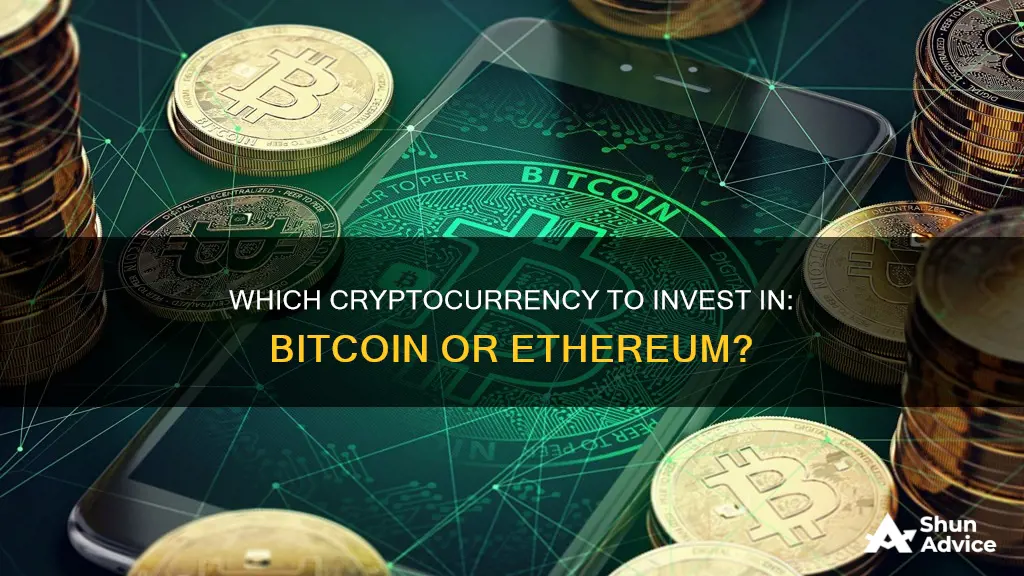
Bitcoin and Ethereum are the two leading cryptocurrencies, but which is the better investment? Both have their pros and cons, so it's important to understand the differences between them before deciding.
Bitcoin is a decentralised digital currency that can be sent between users without a third-party intermediary. It was created in 2008 by a person (or group of persons) using the pseudonym Satoshi Nakamoto, with the first transaction occurring in 2010. Bitcoin is not an application or technology; it is money in digital form. It has a finite supply capped at 21 million, and its primary purpose is to be a digital currency and an alternative to fiat currencies.
Ethereum, on the other hand, is a blockchain platform that supports smart contracts and secure financial transactions. Its native cryptocurrency is called Ether. Smart contracts are software that allows decentralised apps (dApps) to run automatically on a blockchain when certain conditions are met. Ethereum also has a decentralised app (dApp) ecosystem, including gaming, gambling, and socialising. It has better technology and provides more uses than Bitcoin, but it has a higher supply and is less liquid.
Both Bitcoin and Ethereum are popular and established cryptocurrencies, and their performance has been exceptional over the long term. However, both are prone to extreme price volatility, so buying either requires a high-risk tolerance.
So, which is the better investment? It depends on what you're looking for and your risk appetite. If you're looking for a more established and less risky investment, Bitcoin might be the better choice. However, if you're interested in innovation and use cases, Ethereum could be the better option. Ultimately, it's important to do your research and understand the risks before investing in any cryptocurrency.
| Characteristics | Values |
|---|---|
| Purpose | Bitcoin was designed as a way to carry out relatively simple digital payments, whereas Ethereum is a network that supports a complex financial ecosystem |
| Value | Bitcoin is the most highly valued cryptocurrency |
| Acceptance by traditional finance | Bitcoin has seen greater acceptance by traditional finance, evidenced by the approval of spot Bitcoin ETFs in 2024 |
| Smart contracts | Ethereum can support smart contracts, software programs that execute automatically when certain conditions are met. Bitcoin does not have this capability |
| Transaction verification method | Bitcoin uses an energy-intensive method of verifying transactions known as Bitcoin mining. Ethereum has transitioned to a less energy-intensive process called staking |
| Transaction fees | Ethereum fees have tended to be higher than those for Bitcoin |
| Supply | Bitcoin has a finite supply capped at 21 million. Ethereum has an unlimited supply |
| Age | Bitcoin is over 14 years old. Ethereum was launched in 2015 |
| Market capitalisation | Bitcoin has a market capitalisation of $1.3 trillion, dwarfing Ethereum's $420 billion |
| Use cases | Bitcoin is intended as a general-purpose currency for everyday payments. Ethereum is designed for payments on the Ethereum network and to support smart contracts |
| Environmental impact | Bitcoin's energy-intensive mining process has led to significant criticism. Ethereum's recent transition to proof-of-stake is expected to reduce its energy consumption |
| Backers | Ethereum has received public backing from major players in finance and tech, including Microsoft, JP Morgan, Santander Bank, and Intel |
| Risk | Both Bitcoin and Ethereum are high-risk investments |
What You'll Learn

Bitcoin's value as an alternative to fiat currency
One of the most significant differences between Bitcoin and fiat currencies is their approach to supply. Bitcoin has a finite supply of 21 million BTC, whereas fiat currencies have an infinite supply, as central banks can print more money whenever needed. This finite supply of Bitcoin, coupled with its decentralised nature, makes it less susceptible to inflationary risks compared to fiat currencies. The control of fiat currency supply by central banks can lead to inflation, as seen during the US global financial crisis, the European sovereign debt crisis, and the COVID-19 outbreak.
Additionally, Bitcoin's value as an alternative to fiat currency is driven by its increasing demand. Bitcoin's decentralised nature and finite supply have made it attractive to those seeking an alternative to traditional money systems. Its demand is further fuelled by its status as the first cryptocurrency and its growing acceptance as a medium of exchange. More people are becoming familiar with Bitcoin, and its use is increasing among businesses and consumers.
Another factor contributing to Bitcoin's value is its functionality as a store of value and a unit of exchange. It demonstrates the key attributes of a currency, including scarcity, divisibility, acceptability, portability, durability, and uniformity. These attributes enhance its value proposition as an alternative to fiat money.
Lastly, Bitcoin's value is influenced by investor demand. As a speculative investment, Bitcoin's price is highly volatile and susceptible to market forces. Investors buy Bitcoin hoping for profits, and its exchange rate is influenced by investor demand.
In summary, Bitcoin's value as an alternative to fiat currency stems from its decentralised nature, finite supply, increasing demand, functionality as a store of value and unit of exchange, and investor demand. These factors collectively contribute to its growing popularity and perceived value in comparison to traditional fiat currencies.
Bloomberg's Bitcoin: Invest Without Buying
You may want to see also

Ethereum's potential for growth
Ethereum has the best long-term growth potential of any cryptocurrency. It has taken the positive innovations of Bitcoin and improved on them while adding new features and eliminating the negatives. Ethereum's native cryptocurrency, Ether, can be used to pay for services or transaction fees on the network.
Ethereum is a blockchain platform created to support smart contracts and secure financial transactions. Smart contracts are software that allows decentralised apps (dApps) to run automatically on a blockchain when a set of predetermined conditions are met. The Ethereum network includes dApps for gaming, gambling, socialising, and even decentralised finance (DeFi). Most non-fungible tokens (NFTs) are also based on the Ethereum network.
Ethereum has a strong development team led by founder Vitalik Buterin, who is well-respected within the Ethereum community. Ethereum has plans to implement various upgrades, including scalability improvements, anonymous transactions, and the transition from proof-of-work to proof-of-stake, which will prevent miner centralisation, protect against 51% attacks, and decrease the inflation rate.
Ethereum has the backing of major global corporations. The Enterprise Ethereum Alliance consists of giants such as Intel, J.P. Morgan, and Microsoft. The alliance launched on February 28, 2017, with 30 members, and in the first three months, it added 88 additional members and received hundreds of new applications.
Ethereum's value and growth are closely tied to the increasing adoption and utility of its network. As more people and businesses use Ethereum, its value will likely increase. Ethereum's ability to support complex software and its potential for widespread adoption make it an attractive investment opportunity.
Experts predict that Ethereum's price will continue to grow in the coming years. According to Cryptonewz, by the end of 2024, Ether (ETH) will reach $5,000. By 2025, Ethereum is expected to reach a maximum level of $6,500, with a minimum of $4,500 and an average of $5,500. By 2030, it is predicted that Ethereum's price could reach a maximum of $20,500.
While there may be some growing pains and market fluctuations along the way, Ethereum's continuous development, innovative features, and strong community support indicate a positive outlook for its growth potential.
Coinbase Investment: How Much Money Should You Invest?
You may want to see also

Bitcoin's finite supply
Bitcoin has a finite supply capped at 21 million. This is a key characteristic of the cryptocurrency, designed by its anonymous creator Satoshi Nakamoto to limit the supply and increase its scarcity over time, which tends to increase demand and price.
The Bitcoin network uses bit-shift operators—arithmetic operators that round some decimal points down to the closest smallest integer. This rounding down occurs when the block reward for producing a new Bitcoin block is divided in half, and the new reward amount is calculated. As a result, the total number of bitcoins issued is not expected to reach 21 million.
The number of new bitcoins minted per block was 50 when Bitcoin was first established and has since decreased over time. The current block reward is 6.25 bitcoins, and this is expected to halve to 3.125 in 2024. The final bitcoin is not expected to be generated until 2140.
The finite supply of Bitcoin means that it has been pitched as a possible store of value and an alternative to fiat currencies. The limited supply and increasing usage have driven up the value of Bitcoin.
Which Major Banks are Betting on Bitcoin?
You may want to see also

Ethereum's smart contracts
Smart contracts are a fundamental part of Ethereum's application layer. They are computer programs stored on the blockchain that follow "if this, then that" logic and are guaranteed to execute according to the rules defined by their code, which cannot be changed once created.
Smart contracts are a type of Ethereum account. This means they have a balance and can be the target of transactions. However, they are not controlled by a user. Instead, they are deployed to the network and run as programmed. User accounts can interact with a smart contract by submitting transactions that execute a function defined in the smart contract.
Smart contracts can define and automatically enforce rules. They cannot be deleted by default, and interactions with them are irreversible. They are public on the Ethereum blockchain and can be thought of as open APIs. This means that a smart contract can call other smart contracts, greatly extending what is possible.
Smart contracts are self-executing pieces of code that execute when preset conditions are met. For example, a smart contract could be programmed to sell a house when an amount greater than a particular number is offered for the property. It would then transfer the rights and money to the seller, eliminating the need for a broker.
Smart contracts are stored on the blockchain, which means they inherit certain properties, including immutability and global distributability. Being immutable means that once the smart contract is deployed, no one can tamper with it. Global distributability means that everyone on the blockchain network validates the contract's output, making tampering almost impossible.
Smart contracts are predominantly written in Solidity, a high-level, object-oriented language influenced by C++, JavaScript, and Python. It is designed to integrate with the Ethereum Virtual Machine (EVM). The EVM defines the rules for computing a new valid state from block to block, helping the Ethereum blockchain maintain its state.
Bitcoin Derivatives: A Guide to Investing and Trading
You may want to see also

Bitcoin's status as the first cryptocurrency
Bitcoin was created by a computer programmer or group of programmers using the pseudonym Satoshi Nakamoto. Its creation was first described in a 2008 white paper by Nakamoto, which revealed the blockchain system that would be the backbone of the cryptocurrency market. Blockchain is a digital ledger of transactions that is replicated and distributed across a network of computer systems to secure information.
Bitcoin is a decentralized digital payment system that does not require a central authority, such as a bank. It is a blockchain-based, decentralized digital currency powered by a network of users that allows financial transactions without relying on a central authority or intermediary. It is secured by cryptography, with transactions verified by a process known as mining, in which users compete to verify transactions by solving complex mathematical puzzles using powerful computers.
Strategizing Bitcoin Investments: A Beginner's Guide
You may want to see also







